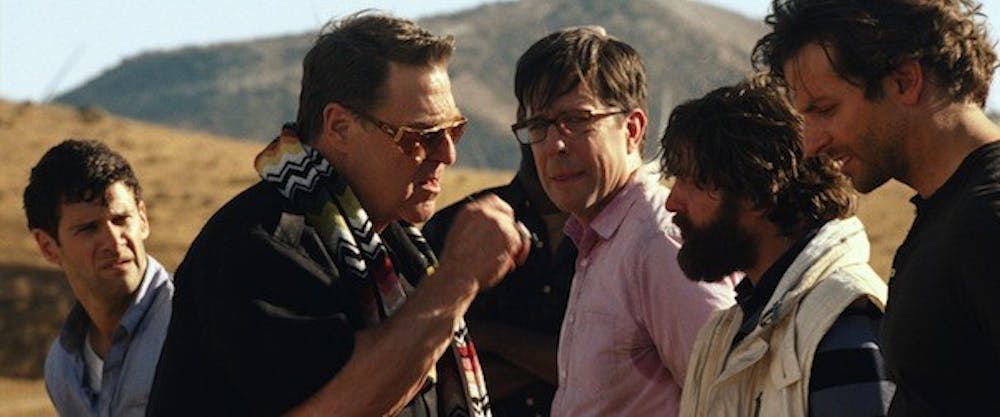The wolfpack is back.
This time, it settles scores, ties up the loose ends and destroys nations in a saga that began in the staggeringly successful "The Hangover."
It's strange to refer to "The Hangover" movies as a trilogy. They weren't films meant to be in a trilogy, evidenced by a critically tepid second film that essentially remade the first film in a different location.
In " The Hangover Part III," Director Todd Phillips ("Old School") with co-writer Craig Mazin ("Identity Thief") have brought another thundering adventure that addresses most of the critiques of the previous films with self-awareness and its tongue firmly planted in cheek.
Phil (Bradley Cooper, "Silver Linings Playbook"), Stu (Ed Helms, "Jeff, Who Lives at Home"), and Doug (Justin Bartha ,"National Treasure") are settling into lives of independent solitude.
But the metrosexual man-child Alan (Zach Galifianakis, "It's Kind of a Funny Story") continues to cause a fracas, being a stay-at-home son and a thorn in his parents' sides.
When Alan's father (Jeffrey Tambor, "Arrested Development") dies, Doug plans to stage an intervention for Alan to end his regressive childish nature. Alan eventually agrees to seek help at an institution with the yuppie moniker "New Horizons."
On their way, they are are run off the road by an unsavory gangster named Marshall (John Goodman, "Argo"). Marshall tells Phil, Stu and Alan to get his precious stolen gold bars back from the recently escaped nuisance Mr. Chow (Ken Jeong, "Community") before he kills the kidnapped Doug.
After a good amount of introduction, "The Hangover Part III" moves briskly and takes great care not to tread worn paths. It works well for a while as a competent crime caper centering on a heist by a group of men who have no qualifications for heisting anything. It abandons the formula of repiecing a mysterious night of debauchery and refashions it as a grim crime-comedy.
There are times in the film that the audience expects comedic gags, but Phillips replaces them with ghastly acts of criminality. It's a jarring, sometimes dyspeptic shift in tone.
Goodman's Marshall is an mirthless villain. He plays it so straight that there isn't any room for laughs.
It contrasts highly with the delightful misanthropy that Mr. Chow brings down upon the trio.
One welcome aspect that "The Hangover" films don't quite get as much credit for is the progressively beautiful photography that the films utilize.
The first film was fairly run-of-the-mill in its cinematography. But the second film, which nodded sometimes to the frenetic, cyclical framing work of Tony Scott, showcased some exceptional visuals.
There are shimmering Las Vegas lights contrasted against barren vistas; a wide, arid desert windmill farm; and an uncharacteristically lyrical prologue prison riot shot in slow motion.
There are occasions when the film slows down to allow the audience to take a breath from the wild conflation of events.
Phillips and Mazin address the critical problems that plagued the second film, notably the danger that Alan presents by simply existing. There's a line between child-like innocence and delusional psychopath, and Alan firmly crossed that line into an unholy force of destruction. Having this film focus on Alan's coming of age as an adult, albeit a naive one, was gratifying.
"The Hangover" might be faulted for having a lack of hangovers, which is rectified eventually. But this is like faulting the "Fast and Furious" franchise for loosing its roots in leery vehicular worship for more plot-focused, albeit ludicrous, material. No one should have to pay for the same movie twice, even three times because of a filmmakers' inability to build new plot strands.
Nothing feels too extraneous. Interesting cameos from Melissa McCarthy ("Identity Thief") and Mike Epps ("The Hangover") have purpose, which is better than having a comedic actor show up, do a shtick, then fizzle into nothingness.
Cooper escapes once again relatively unscathed, save for slightly tousled hair. Helms bears the brunt of some very funny gags, and Galifianakis, rather than an impetus and impediment to action, finally is a tolerable character.
The comedic gags move away from the crass lowbrow hokum of the second film and introduce much needed wit into the script. It feels occasionally ad libbed, but there are also some interesting set piece sequences that balance the seemingly improvised attributes. Consequently, the departure from the lurid antics of the first two will certainly alienate audiences who come to this film expecting more unbridled insanity.
"The Hangover Part III," for all its occasional forays into sophomoric humor, is a more mature and darker work, even for Phillips.
It's grand. It's brash. Tantamount to all that, it's not completely dreadful.
The wolfpack sobers up for a rousing finale and walks into the sunset redeeming its good name.
And all will sleep better at night and stay safer if they never come back.
dkahen-kashi@theeagleonline.com





